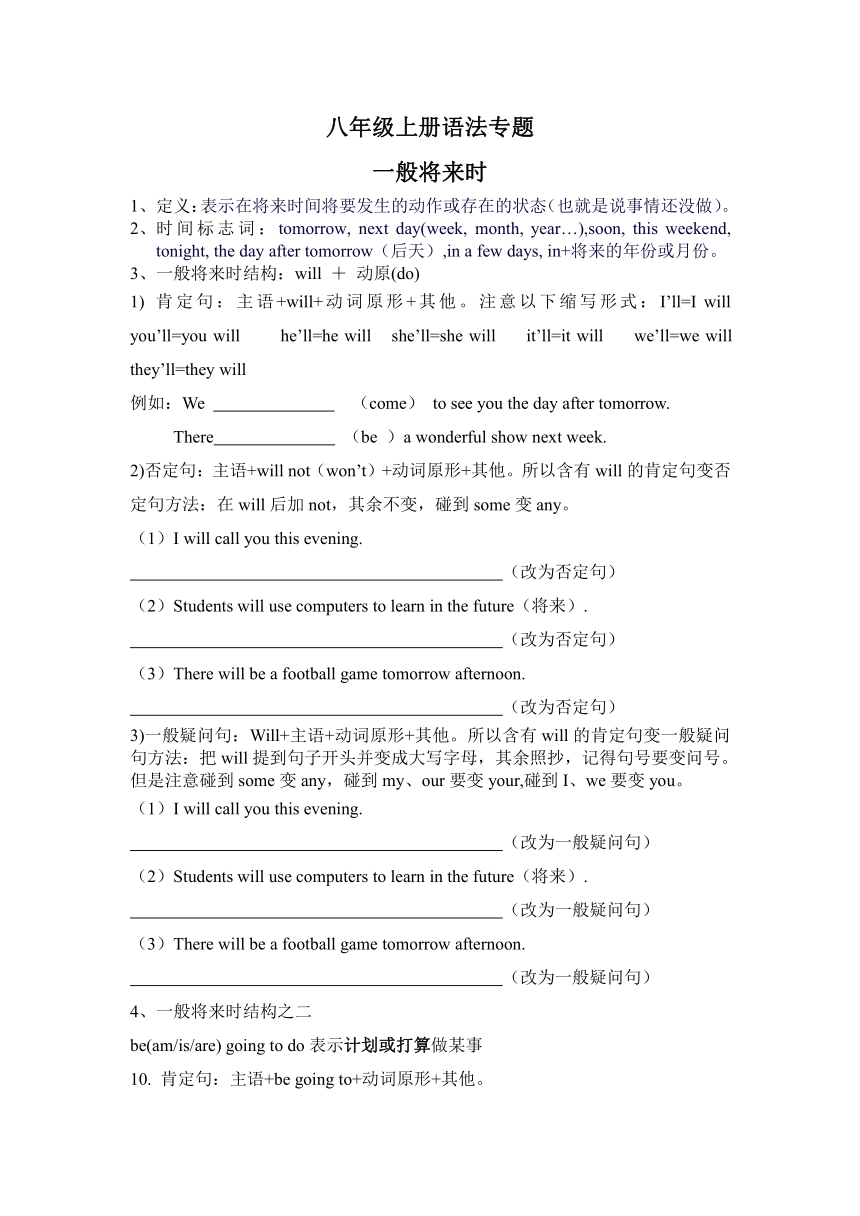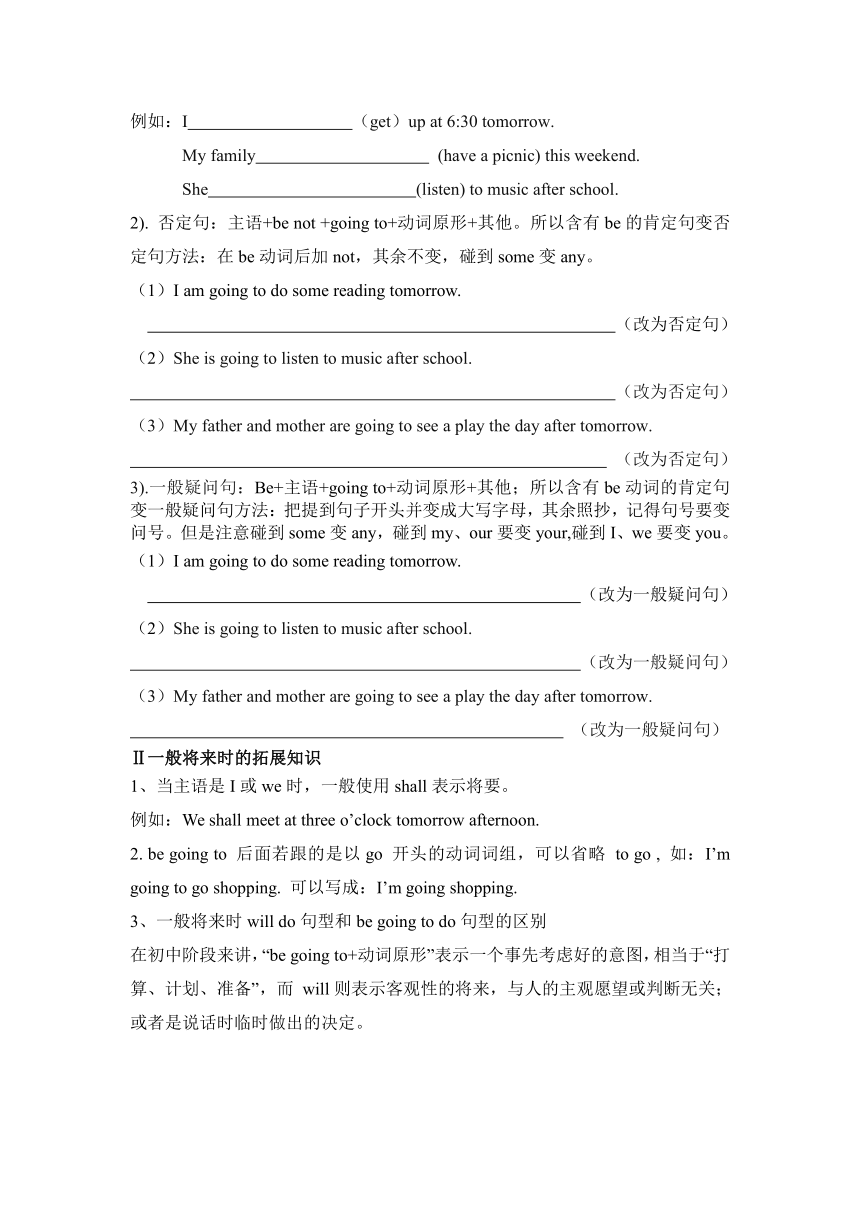语法--一般将来时及练习题(无答案) 2024-2025学年人教版英语八年级上册
文档属性
| 名称 | 语法--一般将来时及练习题(无答案) 2024-2025学年人教版英语八年级上册 |  | |
| 格式 | docx | ||
| 文件大小 | 21.2KB | ||
| 资源类型 | 教案 | ||
| 版本资源 | 人教新目标(Go for it)版 | ||
| 科目 | 英语 | ||
| 更新时间 | 2024-09-07 15:14:00 | ||
图片预览


文档简介
八年级上册语法专题
一般将来时
定义:表示在将来时间将要发生的动作或存在的状态(也就是说事情还没做)。
时间标志词:tomorrow, next day(week, month, year…),soon, this weekend, tonight, the day after tomorrow(后天),in a few days, in+将来的年份或月份。
一般将来时结构:will + 动原(do)
1) 肯定句:主语+will+动词原形+其他。注意以下缩写形式:I’ll=I will you’ll=you will he’ll=he will she’ll=she will it’ll=it will we’ll=we will they’ll=they will
例如:We (come) to see you the day after tomorrow.
There (be )a wonderful show next week.
2)否定句:主语+will not(won’t)+动词原形+其他。所以含有will的肯定句变否定句方法:在will后加not,其余不变,碰到some变any。
(1)I will call you this evening.
(改为否定句)
(2)Students will use computers to learn in the future(将来).
(改为否定句)
(3)There will be a football game tomorrow afternoon.
(改为否定句)
3)一般疑问句:Will+主语+动词原形+其他。所以含有will的肯定句变一般疑问句方法:把will提到句子开头并变成大写字母,其余照抄,记得句号要变问号。但是注意碰到some变any,碰到my、our要变your,碰到I、we要变you。
(1)I will call you this evening.
(改为一般疑问句)
(2)Students will use computers to learn in the future(将来).
(改为一般疑问句)
(3)There will be a football game tomorrow afternoon.
(改为一般疑问句)
4、一般将来时结构之二
be(am/is/are) going to do表示计划或打算做某事
10. 肯定句:主语+be going to+动词原形+其他。
例如:I (get)up at 6:30 tomorrow.
My family (have a picnic) this weekend.
She (listen) to music after school.
2). 否定句:主语+be not +going to+动词原形+其他。所以含有be的肯定句变否定句方法:在be动词后加not,其余不变,碰到some变any。
(1)I am going to do some reading tomorrow.
(改为否定句)
(2)She is going to listen to music after school.
(改为否定句)
(3)My father and mother are going to see a play the day after tomorrow.
(改为否定句)
3).一般疑问句:Be+主语+going to+动词原形+其他;所以含有be动词的肯定句变一般疑问句方法:把提到句子开头并变成大写字母,其余照抄,记得句号要变问号。但是注意碰到some变any,碰到my、our要变your,碰到I、we要变you。
(1)I am going to do some reading tomorrow.
(改为一般疑问句)
(2)She is going to listen to music after school.
(改为一般疑问句)
(3)My father and mother are going to see a play the day after tomorrow.
(改为一般疑问句)
Ⅱ一般将来时的拓展知识
当主语是I或we时,一般使用shall表示将要。
例如:We shall meet at three o’clock tomorrow afternoon.
2. be going to 后面若跟的是以go 开头的动词词组,可以省略 to go , 如:I’m going to go shopping. 可以写成:I’m going shopping.
3、一般将来时will do句型和be going to do句型的区别
在初中阶段来讲,“be going to+动词原形”表示一个事先考虑好的意图,相当于“打算、计划、准备”,而 will则表示客观性的将来,与人的主观愿望或判断无关;或者是说话时临时做出的决定。
【巩固练习】
I. 选择填空。
1. — You look excited.
— Yes, I am. I _____ Jackie Chan’s new movie in Dalian this evening.
A. was going to B. went to C. am going to D. have gone to
2. There are many clouds coming. It _________ rain soon.
A. will B. is going to C. looks like D. likes
3. There _____ a talk show on CCTV-4 at nine this evening.
A. will have B. is going to be C. is going to have D. is having
4. — There _____ two football matches on TV tomorrow afternoon.
— Really That’s great.
A. will have B. are going to be C. is going to be D. are going to have
5. There is going to _____ a report ____ Chinese history in our school this evening.
A. have, on B. be, on C. have, for D. be, of
真题连接:
1. —Have you finished the poster for the party
—Not yet. I it in two days.
A. finish B. finished C. will finish
2. Stop smoking, Joe! You ____ yourself if you keep on doing it like that!
A. will kill B. have killed C. kill D. killed
3. If you read a lot, your life ______ full of pleasure.
A. is B. will be C. be D. was
4. — Where is the morning paper — I ______ it for you at once.
A.get B. am getting C. to get D. will get
5. There _______ a football match tonight.
A.were B. are C. was D. will be
6. Look at those black clouds, it _____ rain.
A.will B. is going to C. would
7. We hope Mary ______ to us as soon as she reaches London.
A.write B. to write C. will write D. writes
II. 用所给动词的适当形式填空。
1. Today is a sunny day. We are __________ (have) a picnic this afternoon.
2. Tom often ____________(go) to school on foot. But today is raining.
3. —What do you usually do at weekends
—I usually __________ (watch) TV and __________(catch) insects(昆虫)
4. —It’s Friday today. What is she going to do this weekend
—She ______________ (watch) TV and _________ (catch) insects.
5. —What ______________ (do) next Sunday
—I ______________ (milk) cows.
Mary ____________ (visit) her grandparents tomorrow.
7. Tomorrow morning, Bill _____________(go) to have his first class.
8. She_____ ( fly) to Beijing next Sunday for her holiday.
9. Next year Wang Lin ______________( be) sixteen.
10. He ______________ (be) a pilot next year.
III. 句式转换,每空一词。
1. Nancy is going to go camping.(改为否定句)
Nancy ________ going to go camping.
2. I’ll go and join them.(改为否定句)
I _______ go ______ join them.
3. I’m going to get up at 6:30 tomorrow.(改为一般疑问句)
________ _______ ________ to get up at 6:30 tomorrow
4. We will meet at the bus stop at 10:30.(改为一般疑问句)
_______ ________ meet at the bus stop at 10:30
5. She is going to listen to music after school.(对划线部分提问)
________ _______ she ________ ________ _________ after school
6. My father and mother are going to see a play the day after tomorrow.(对划线部分提问)
_________ _________ ________ father and mother going to see a play
7. We are going to play ping-pong on Saturday. (改为一般疑问句并作否定回答)
— __________ __________ going to play ping-pong on Saturday
— __________, we __________.
8. He’s going to tell me all about it. (改为否定句)
He __________ __________ going to tell me all about it.
9. She is going to work hard at English this term. (对划线部分提问)
__________ she __________ this term
10. They’re going to the Sun Island by bus. (对划线部分提问)
__________ __________they __________ __________ the Sun Island
11. The students of Class Three have a field trip on Sunday. (用next Sunday改写)
The students of Class Three _________ __________ __________ __________ a field trip next Sunday.
12. Linda has lunch at school on Tuesday. (用next Tuesday改写)
Linda _________ _________ __________ __________ lunch at school next Tuesday
一般将来时
定义:表示在将来时间将要发生的动作或存在的状态(也就是说事情还没做)。
时间标志词:tomorrow, next day(week, month, year…),soon, this weekend, tonight, the day after tomorrow(后天),in a few days, in+将来的年份或月份。
一般将来时结构:will + 动原(do)
1) 肯定句:主语+will+动词原形+其他。注意以下缩写形式:I’ll=I will you’ll=you will he’ll=he will she’ll=she will it’ll=it will we’ll=we will they’ll=they will
例如:We (come) to see you the day after tomorrow.
There (be )a wonderful show next week.
2)否定句:主语+will not(won’t)+动词原形+其他。所以含有will的肯定句变否定句方法:在will后加not,其余不变,碰到some变any。
(1)I will call you this evening.
(改为否定句)
(2)Students will use computers to learn in the future(将来).
(改为否定句)
(3)There will be a football game tomorrow afternoon.
(改为否定句)
3)一般疑问句:Will+主语+动词原形+其他。所以含有will的肯定句变一般疑问句方法:把will提到句子开头并变成大写字母,其余照抄,记得句号要变问号。但是注意碰到some变any,碰到my、our要变your,碰到I、we要变you。
(1)I will call you this evening.
(改为一般疑问句)
(2)Students will use computers to learn in the future(将来).
(改为一般疑问句)
(3)There will be a football game tomorrow afternoon.
(改为一般疑问句)
4、一般将来时结构之二
be(am/is/are) going to do表示计划或打算做某事
10. 肯定句:主语+be going to+动词原形+其他。
例如:I (get)up at 6:30 tomorrow.
My family (have a picnic) this weekend.
She (listen) to music after school.
2). 否定句:主语+be not +going to+动词原形+其他。所以含有be的肯定句变否定句方法:在be动词后加not,其余不变,碰到some变any。
(1)I am going to do some reading tomorrow.
(改为否定句)
(2)She is going to listen to music after school.
(改为否定句)
(3)My father and mother are going to see a play the day after tomorrow.
(改为否定句)
3).一般疑问句:Be+主语+going to+动词原形+其他;所以含有be动词的肯定句变一般疑问句方法:把提到句子开头并变成大写字母,其余照抄,记得句号要变问号。但是注意碰到some变any,碰到my、our要变your,碰到I、we要变you。
(1)I am going to do some reading tomorrow.
(改为一般疑问句)
(2)She is going to listen to music after school.
(改为一般疑问句)
(3)My father and mother are going to see a play the day after tomorrow.
(改为一般疑问句)
Ⅱ一般将来时的拓展知识
当主语是I或we时,一般使用shall表示将要。
例如:We shall meet at three o’clock tomorrow afternoon.
2. be going to 后面若跟的是以go 开头的动词词组,可以省略 to go , 如:I’m going to go shopping. 可以写成:I’m going shopping.
3、一般将来时will do句型和be going to do句型的区别
在初中阶段来讲,“be going to+动词原形”表示一个事先考虑好的意图,相当于“打算、计划、准备”,而 will则表示客观性的将来,与人的主观愿望或判断无关;或者是说话时临时做出的决定。
【巩固练习】
I. 选择填空。
1. — You look excited.
— Yes, I am. I _____ Jackie Chan’s new movie in Dalian this evening.
A. was going to B. went to C. am going to D. have gone to
2. There are many clouds coming. It _________ rain soon.
A. will B. is going to C. looks like D. likes
3. There _____ a talk show on CCTV-4 at nine this evening.
A. will have B. is going to be C. is going to have D. is having
4. — There _____ two football matches on TV tomorrow afternoon.
— Really That’s great.
A. will have B. are going to be C. is going to be D. are going to have
5. There is going to _____ a report ____ Chinese history in our school this evening.
A. have, on B. be, on C. have, for D. be, of
真题连接:
1. —Have you finished the poster for the party
—Not yet. I it in two days.
A. finish B. finished C. will finish
2. Stop smoking, Joe! You ____ yourself if you keep on doing it like that!
A. will kill B. have killed C. kill D. killed
3. If you read a lot, your life ______ full of pleasure.
A. is B. will be C. be D. was
4. — Where is the morning paper — I ______ it for you at once.
A.get B. am getting C. to get D. will get
5. There _______ a football match tonight.
A.were B. are C. was D. will be
6. Look at those black clouds, it _____ rain.
A.will B. is going to C. would
7. We hope Mary ______ to us as soon as she reaches London.
A.write B. to write C. will write D. writes
II. 用所给动词的适当形式填空。
1. Today is a sunny day. We are __________ (have) a picnic this afternoon.
2. Tom often ____________(go) to school on foot. But today is raining.
3. —What do you usually do at weekends
—I usually __________ (watch) TV and __________(catch) insects(昆虫)
4. —It’s Friday today. What is she going to do this weekend
—She ______________ (watch) TV and _________ (catch) insects.
5. —What ______________ (do) next Sunday
—I ______________ (milk) cows.
Mary ____________ (visit) her grandparents tomorrow.
7. Tomorrow morning, Bill _____________(go) to have his first class.
8. She_____ ( fly) to Beijing next Sunday for her holiday.
9. Next year Wang Lin ______________( be) sixteen.
10. He ______________ (be) a pilot next year.
III. 句式转换,每空一词。
1. Nancy is going to go camping.(改为否定句)
Nancy ________ going to go camping.
2. I’ll go and join them.(改为否定句)
I _______ go ______ join them.
3. I’m going to get up at 6:30 tomorrow.(改为一般疑问句)
________ _______ ________ to get up at 6:30 tomorrow
4. We will meet at the bus stop at 10:30.(改为一般疑问句)
_______ ________ meet at the bus stop at 10:30
5. She is going to listen to music after school.(对划线部分提问)
________ _______ she ________ ________ _________ after school
6. My father and mother are going to see a play the day after tomorrow.(对划线部分提问)
_________ _________ ________ father and mother going to see a play
7. We are going to play ping-pong on Saturday. (改为一般疑问句并作否定回答)
— __________ __________ going to play ping-pong on Saturday
— __________, we __________.
8. He’s going to tell me all about it. (改为否定句)
He __________ __________ going to tell me all about it.
9. She is going to work hard at English this term. (对划线部分提问)
__________ she __________ this term
10. They’re going to the Sun Island by bus. (对划线部分提问)
__________ __________they __________ __________ the Sun Island
11. The students of Class Three have a field trip on Sunday. (用next Sunday改写)
The students of Class Three _________ __________ __________ __________ a field trip next Sunday.
12. Linda has lunch at school on Tuesday. (用next Tuesday改写)
Linda _________ _________ __________ __________ lunch at school next Tuesday
同课章节目录
- Unit 1 Where did you go on vacation?
- Section A
- Section B
- Unit 2 How often do you exercise?
- Section A
- Section B
- Unit 3 I'm more outgoing than my sister.
- Section A
- Section B
- Unit 4 What's the best movie theater?
- Section A
- Section B
- Unit 5 Do you want to watch a game show?
- Section A
- Section B
- Unit 6 I'm going to study computer science.
- Section A
- Section B
- Unit 7 Will people have robots?
- Section A
- Section B
- Unit 8 How do you make a banana milk shake?
- Section A
- Section B
- Unit 9 Can you come to my party?
- Section A
- Section B
- Unit 10 If you go to the party, you'll have a grea
- Section A
- Section B
